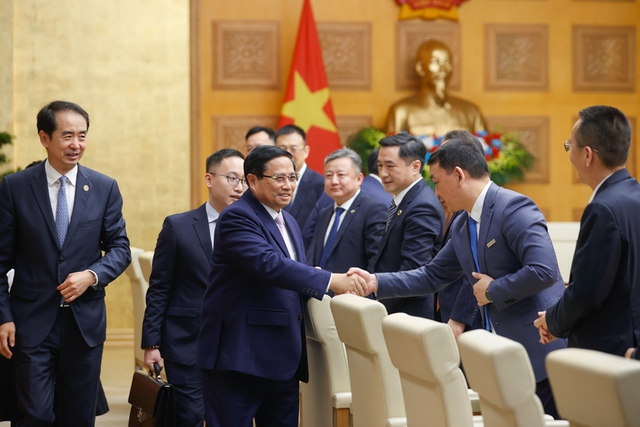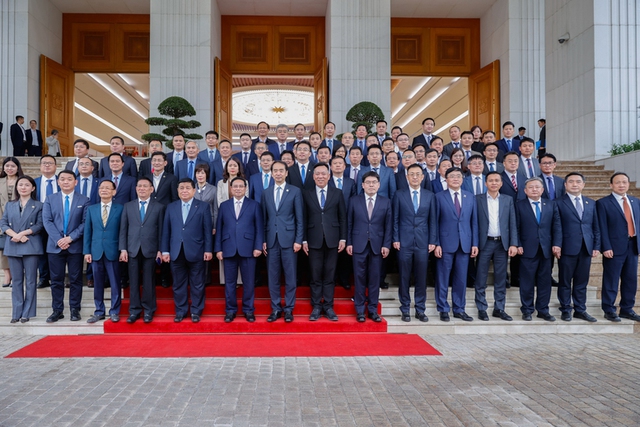Prime Minister Pham Minh Chinh presides over dialogue with Chinese enterprises
VGP - Vietnamese and Chinese enterprises should work to realize high-level agreements reached by the two countries through specific programs and projects, with tangible outcomes, Prime Minister Pham Minh Chinh said.

Prime Minister Pham Minh Chinh shakes hands with leaders of Chinese firms during a dialogue in Ha Noi, Febbruary 28, 2025
During a dialogue with Chinese companies in Ha Noi on February 28, Prime Minister Pham encouraged them to step up technology transfer, enabling Vietnamese firms to join the global value chain and expand their investment horizons.
He called for increased investment in traditional growth drivers such as investment, exports, and consumption, while also fostering new growth engines, especially in semiconductor, artificial intelligence, cloud computing, the Internet of Things, optoelectronics, quantum technology, biotechnology, new materials technology, and high-value services like digital payment solutions.
The Chinese enterprises were asked to continue providing Viet Nam with valuable insights to refine its institutional framework and share smart governance expertise.
The Prime Minister also highlighted critical areas for investments, including clean and renewable energy, transportation infrastructure such as railways, airports, seaports, and highways, as well as industrial parks and economic zones. He suggested they should promote digital payments, expand the scope of local currency payments, invest in financial centers, advance green finance, and boost two-way trade via the establishment of border economic zones and smart border gates.
Viet Nam, he assured, is committed to protecting the legitimate rights and interests of enterprises, ensuring their equal access to policies, and fostering a pro-business climate grounded in the principles of "harmonizing interests and sharing risks". This approach aims to balance the interests of the State, businesses, and citizens alike.

Highlighting Viet Nam's macro-economic stability marked by controlled inflation, manageable public, foreign and sovereign debts, stable exchange rates and favorable interest rates, he announced the country's target of achieving 8 percent growth this year, paving the way for double-digit growth in the coming years.
To achieve this, all sectors, localities, units, businesses and citizens must demonstrate strong determination and take drastic actions. This requires the collective effort of the business community, including Chinese enterprises, he said.
To further nurture the Viet Nam – China comprehensive strategic cooperative partnership, he proposed connecting the two economies and business communities via people-to-people exchanges.
Vietnamese and Chinese enterprises must take the lead in realizing agreements reached by the two countries' leaders through specific programs and projects, in celebration of the 75th anniversary of diplomatic ties in 2025, he said.
Chinese Ambassador to Viet Nam He Wei and Chinese firms praised Viet Nam's investment-friendly climate and immense growth potential, especially the Vietnamese Government's consistent support and frequent dialogues with investors to tackle their challenges.
The Chinese companies expressed keen interest in expanding investments and raised proposals regarding projects in urban development, Viet Nam-China railway connectivity, urban rail systems in Ha Noi and Ho Chi Minh City, expressways, seaports, renewable energy, financial and banking centers, electric vehicle production, digital infrastructure, science and technology, and aviation. They also requested further streamlining of administrative procedures, labor permits, and visa policies to enhance operational efficiency.
Viet Nam remains China's largest trade partner within ASEAN and its fifth largest globally. China, in turn, stands as Vietnam's biggest import market and second largest export destination.
China also leads in the number of newly-licensed projects in Viet Nam. As of August 2024, China's cumulative registered FDI in Viet Nam reached US$29.1 billion across 4,865 active projects, ranking sixth among 149 countries and territories investing there.
While Chinese firms initially focused on Viet Nam's processing and manufacturing industries, including home appliances, leather and footwear, and apparel, they are now actively exploring opportunities in energy, construction, infrastructure, electronics, automobiles and finance-banking./.

